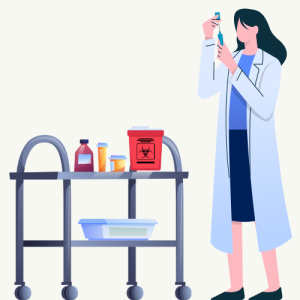On this page: Background | Educational Resources | Setting-Specific Resources | Patient Resources | Regulatory Resources

Background
Safe injection practices help stop the spread of viruses like HIV, hepatitis B, and hepatitis C, as well as bacteria and other germs. These practices include basic steps to prevent infections and keep both healthcare workers and patients safe during procedures like giving injections or checking blood sugar levels. Infections or outbreaks can happen if healthcare workers don’t use proper medical equipment such as syringes, needles, medication vials, blood glucose monitors, or insulin pens.
Learn more about how to prevent bloodborne pathogens in healthcare facilities on the VDH bloodborne pathogens page.
Educational Resources
- Competency Templates
- Assisted Blood Glucose Monitoring (Word) (fillable PDF)
- Injectable Medications (Word) (fillable PDF)
- Competency Validation Tools
- Assisted Blood Glucose Monitoring (Word) (fillable PDF)
- Injectable Medications (Word) (fillable PDF)
- Flyers/One-Pagers
- Policy Templates
- Hand Hygiene
- Infection Control Precautions
- Infection Prevention and Control
VDH Infection Prevention and Control Assessments: The HAI/AR team is available to conduct a no-cost, non-regulatory, onsite visit to help a facility identify its infection prevention strengths and areas of opportunity.
- Considerations for Blood Glucose Monitoring and Insulin Administration
- Injection Safety - Infection Control Assessment Tool
- Injection Safety Resources for Providers
- Point of Care Blood Testing – Infection Control Assessment Tool
- Preventing Unsafe Injections – overview of safe injection practices
- Safe Injection Practices to Prevent Transmission of Infections to Patients
Association for Professionals in Infection Control and Epidemiology
Virginia Healthcare-Associated Infections Advisory
- Virginia Infection Prevention and Control Training Alliance (VIPTA) - search the education and training resource library for resources related to injection safety
VCU Virginia Infection Prevention Training Center>
- Virginia Infection Prevention Training Center (VIPTC) - courses and trainings related to infection prevention and control
World Health Organization (WHO)
Setting-Specific Resources
Nursing Homes
- Regulatory Update: Blood Glucose Monitoring (August 2010)
Patient Resources
Regulatory Resources
Centers for Medicare & Medicaid Services (CMS)
- Regulatory Update: Blood Glucose Monitoring (August 2010)
Virginia Department of Social Services
- Regulatory Update: Blood Glucose Monitoring (February 2011)
